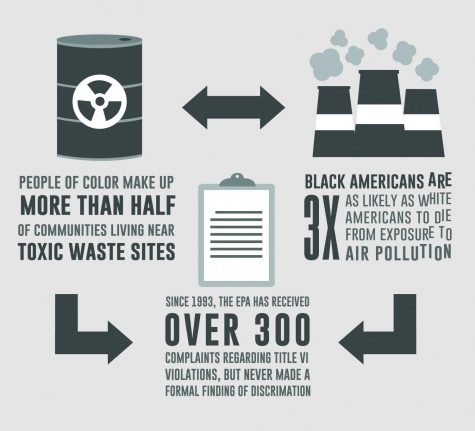The privilege of focusing on the future
People of color are facing the consequences of climate change
September 27, 2019
In lieu of the UN Climate Action Summit 2019, and led by the trending 16-year-old eco-warrior Greta Thunberg, approximately 4 million people around the world marched on Friday in a global climate strike.
Inspired by Thunberg’s own school strike, the march last week was composed largely of youth demanding action and attention from legislators. Young people have recently become the faces of both the climate crisis and the climate revolution as they represent the generations that will be left to feel the inherited effects of rising sea levels, mass extinction and atmospheric erosion.
 Children have long been symbols of hope in times of crisis, motivating change so that the next generation may experience a better future. Meanwhile, the children of the climate revolution represent the encroaching reality that the window for achieving the dream of a healthy climate is rapidly closing.
Children have long been symbols of hope in times of crisis, motivating change so that the next generation may experience a better future. Meanwhile, the children of the climate revolution represent the encroaching reality that the window for achieving the dream of a healthy climate is rapidly closing.
There cannot be a better future if there is no future at all.
While it is true that the impacts of climate change will continue to worsen exponentially, the centrality of “the future” in climate activism ignores the impacts felt right now and erases the experiences of the communities for whom climate change is not a future concern, but a reality that has present physical and psychological effects.
These communities are disproportionately made up of marginalized people, specifically people of color.
Vic Barrett, 20, was one of four youth climate activists who testified before Congress Wednesday, Sept. 18. As a first generation Garifuna American, Barrett called attention to the issue of environmental racism by demonstrating how he has directly been affected by climate change.
Growing up in New York, Barrett explained that he, his family and his school went without power for days as a result of what he called the “climate-change-fueled Hurricane Sandy.” As someone who already struggles with anxiety and depression, Barrett also shared that he still experiences “grave anxiety about experiencing another climate-driven disaster like Superstorm Sandy and the harm that these storms will have on myself and my family.”
In response to his trauma and the inadequacy of environmental legislation, Barrett joined 21 other youth plaintiffs in suing the federal government on account of knowingly causing climate change in the 2015 Juliana v. United States lawsuit.
Barrett’s testimony and advocacy speaks for the vulnerable communities for whom climate change is a current threat to survival.
In his testimony, Barrett stated that “these frontline communities are made up of people who look like me young, black and brown, LGBTQ, indigenous identities which place them at a significantly higher risk to experience the impact of climate change than the rest of the population due to their marginalized status in our society.”
The National Resource Defense Council analyzed 20 years of data between 1987 and 2007 and found that people of color make up more than half of communities living near toxic waste sites.
The continuing water crisis in Flint, Michigan serves as a reminder that those same demographics are twice as likely as wealthy and white Americans to live without potable water and proper sanitation.
In 2006, the EPA recognized that carcinogenic particles found in air pollutants — such as car exhaust and city smog — are significant causes of serious respiratory problems including asthma, heart attacks and premature death. According to research done by the New England Journal of Medicine in 2017, black Americans are three times as likely as white Americans to die from exposure from air pollution.
Unfortunately, the EPA also has a history of delaying and denying civil rights claims brought by communities of color, including those filed by the Flint community, against corporations causing pollution.
In his 2016 article in The Atlantic, Vann R. Newkirk II notes that since its establishment in 1993, the EPA has received over 300 complaints regarding Title VI violations and yet has never made a formal finding of discrimination.
Title VI of the Civil Rights Act of 1964 is a regulation prohibiting “discrimination based on race, color or national origin in programs or activities which receive federal financial assistance.”
In many of these cases, the EPA simply tabled complaints until the 180 day period set in place to ensure prompt responses had expired. Many claims have even been put aside for years only to be rendered moot.
In a 2015 court decision, Federal District Court Judge Saundra Brown Armstrong of California wrote that “the EPA often takes years to act on a complaint — and even then, acts only after a lawsuit has been filed.”
“The EPA has allowed Plaintiffs’ complaints to languish for decades,” she continued.
The most recent Title VI resolution published by the EPA details a complaint filed on June 20, 2013, which accused the Orange County Planning and Inspections Department of “intentionally discriminating on the basis of race by denying water and sewer service to the African American residents of the Rogers Road community” in Orange County, California.
On September 11, 2019, the EPA published a Resolution and Closure Letter for this complaint that renders the allegations of environmental racism as moot due to the fact that the community finally received water and sewer services on June 27, 2019.
In other words, the EPA waited six years to respond to this complaint and finally did so only when the problem was already solved. By not investigating the case, the EPA not only denied a community of color access to clean water and modern sanitation but denied them the legal validation of and retribution for the environmental racism they experienced.
Greta Thunberg is right in her demands for legislators to listen to the scientists who can confirm that climate change is real and getting worse. But it is just as necessary that the voices of the people who are experiencing the worst of climate change right now be heard as evidence to support the legitimacy and urgency of a climate revolution.
True environmental justice is racial justice.


























































































